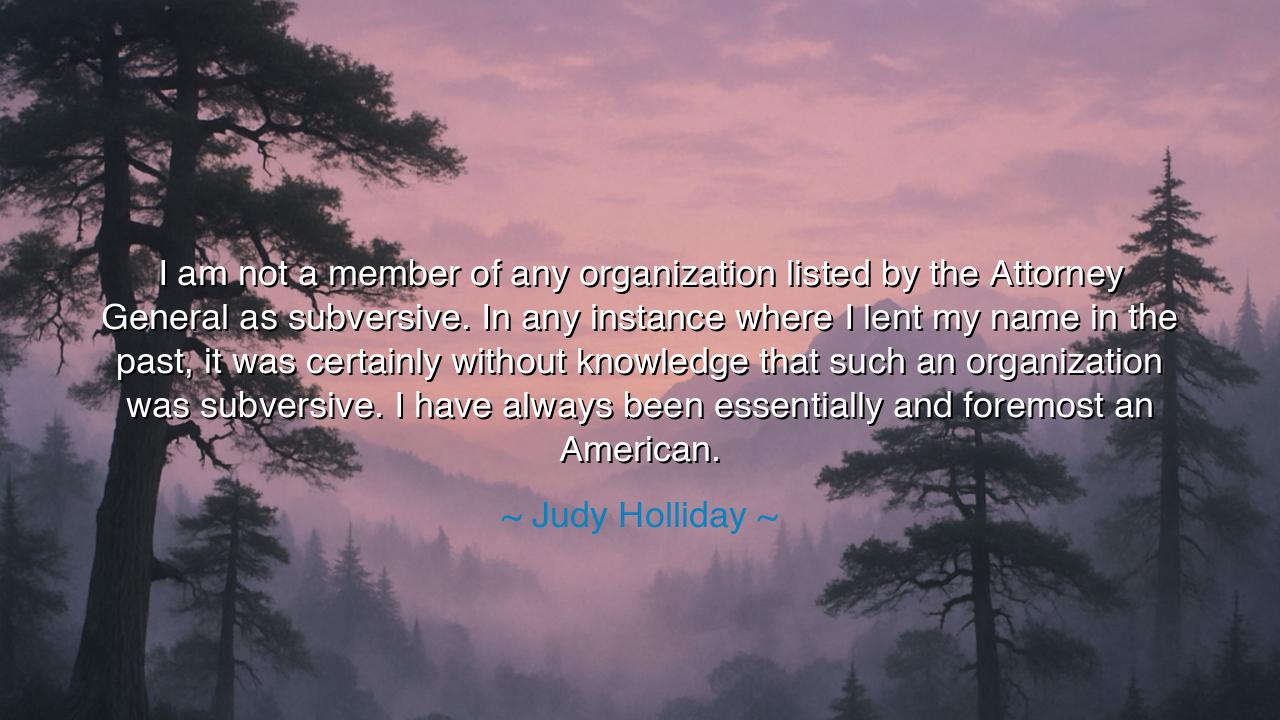
I am not a member of any organization listed by the Attorney
I am not a member of any organization listed by the Attorney General as subversive. In any instance where I lent my name in the past, it was certainly without knowledge that such an organization was subversive. I have always been essentially and foremost an American.






“I am not a member of any organization listed by the Attorney General as subversive. In any instance where I lent my name in the past, it was certainly without knowledge that such an organization was subversive. I have always been essentially and foremost an American.”
Thus spoke Judy Holliday, the golden star of stage and screen, whose laughter once lit the theatres of the world, yet who found herself standing before the grim tribunal of suspicion during one of the darkest storms of modern history — the Red Scare. Her words, spoken not as a performer but as a soul defending its honor, echo with the trembling courage of those who were caught in an age when fear became a weapon and patriotism a test of loyalty. They are more than a declaration; they are a lament for truth in a time of shadows, and a testament to the resilience of conscience.
In this quote, the essence lies in her claim: “I have always been essentially and foremost an American.” These words, simple yet profound, do not refer merely to citizenship, but to the deeper meaning of belonging — to the ideals of freedom, fairness, and individual dignity. To be “an American,” in the ancient moral sense, is not to bow before power, but to stand in the light of truth, even when darkness gathers. Holliday, an artist of wit and warmth, found herself accused not of deeds, but of association — a fate shared by many whose only crime was to think, to dream, to speak freely. Her defense was not one of rebellion, but of fidelity: fidelity to the values that America itself proclaimed — justice, honesty, and independence of thought.
The time in which she spoke was one of turmoil and fear. In the 1950s, under the long shadow of Senator Joseph McCarthy, the nation trembled before the phantom of Communist infiltration. Lists were drawn, names whispered, and artists — the very weavers of imagination — were branded as threats. Holliday, like so many, was summoned to prove her loyalty, as if loyalty could be measured by words alone. In that moment, her declaration became a mirror to her generation — a reflection of countless innocent souls yearning to be believed, to be seen not as conspirators, but as citizens.
Her words, “in any instance where I lent my name in the past,” reveal a humility rare in the face of accusation. She did not curse her accusers nor plead ignorance to shield herself. Instead, she spoke with quiet clarity — acknowledging human fallibility while holding firm to her integrity. It was as if she were saying, I may have erred in knowledge, but never in heart. In this, she stood among the noble lineage of those who face unjust judgment with grace — like Socrates before the Athenians, or Galileo before the Inquisition — knowing that truth may bend under pressure, but it never breaks.
To “always be an American”, then, is to claim not a flag, but a spirit. It is to live by the conviction that freedom of thought is sacred, and that no government, no authority, has the right to chain the human mind. Holliday’s defense reminds us that patriotism is not obedience, but courage — the courage to be honest, even when honesty is dangerous. Her quiet resolve stood as a rebuke to the fever of her age, and her voice — soft but unwavering — whispered a lesson that the ancients knew well: that character, not conformity, defines the true citizen.
In her story, we see not merely one woman’s defense, but the plight of all who are misunderstood by their times. History tells of many such souls — artists, thinkers, prophets — who were accused of subversion when in truth they sought only to uplift. From the poet Ovid exiled by Rome, to the philosopher Spinoza cast out by his own people, to Holliday herself, the pattern repeats: the world often fears what it should cherish. Yet, in each age, there are those who stand firm, and through their suffering, truth survives.
The lesson that arises from Judy Holliday’s words is clear and eternal: never let fear dictate your identity. The wise do not surrender their principles to the noise of accusation. They remember that loyalty to one’s nation begins with loyalty to one’s conscience. If you are ever called to account for what you believe, speak as she did — with calm dignity, with truth as your armor, and with love as your banner. For to be “essentially and foremost an American,” or indeed a child of any free nation, is to hold sacred the right to think, to speak, and to live in truth.
So, my child of the future, let her example guide you. When the winds of judgment rise, when the world demands that you prove your worth, remember Judy Holliday’s steadfast voice. Let no accusation make you forsake your essence. Stand firm in truth, speak with grace, and live by the light of your own integrity. For those who remain faithful to what is right — in heart, not merely in word — carry within them the true spirit of freedom, and through them, the soul of a nation endures.






AAdministratorAdministrator
Welcome, honored guests. Please leave a comment, we will respond soon